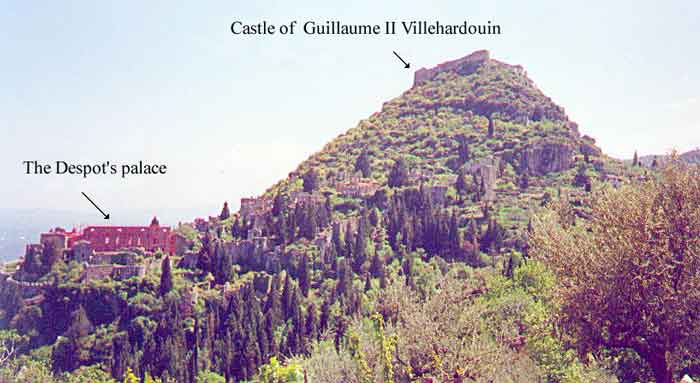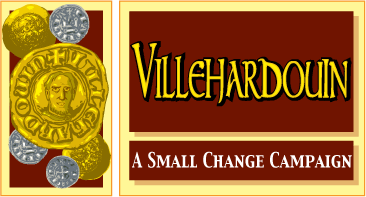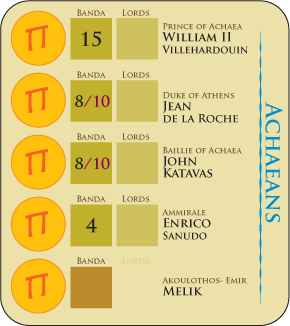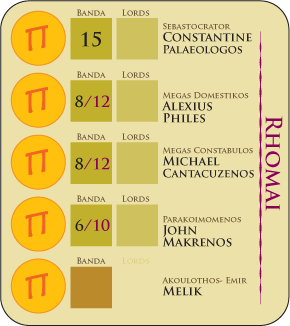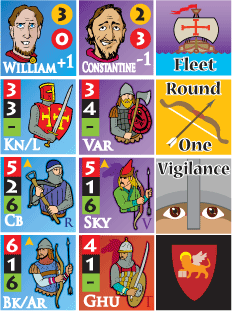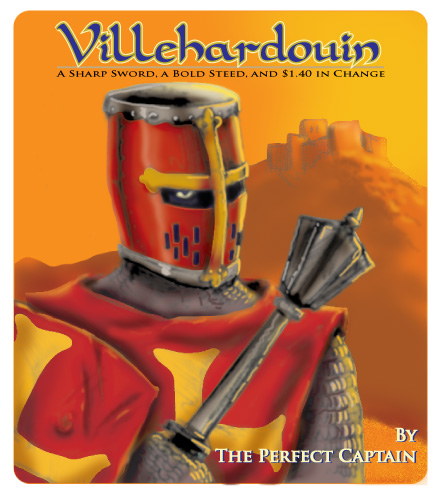I will tell a tale to thee rehearse, a tale of import mighty
And if attention you do lend, I hope the tale will please you
T'is how the Frank by arms did gain the realm of fair Morea
From 'The Chronicle of Morea'
Welcome friend, to the page that brings the "crew" to the Crusades
---------------------------
Contact us
The Perfect Captain
---------------------------
A small game with a BIG heart!
The first in our series of Spare Change games, Villehardouin is a campaign game of the Byzantine Reconquest of the Morea in southern Greece in the year 1263 AD.
Players take the role of either the Achaean Franks under Prince William de Villehardouin, freshly back from captivity in Constantinople, or that of the Byzantine Empire under the Sebastocrator Constantine (the Emperor Michael VIII's step-brother).
Hey Buddy! Spare some change?
No, the perfect Captain hasn’t fallen on hard times, and started charging for his games- heaven forfend!!!
No, he’s just doing his part to save you some printer ink, through the twin virtues of MINIATURIZATION and IMPROVISATION!
How it all happened....
As many of you well know, the Captain delights in taking the path least trodden. So he had his eye on an obscure campaign set in the heart of Crusader Greece in the 13th century, thinking it was ripe for a treatment. Also, being an inveterate lover of miniature things, he responded quite positively when presented with a CD case by one of his graphics flunkies… er, craftsmen, who proposed to cram an entire campaign game into said box. “I’ll be Super-Amalgamated!” said the Captain, and thereby gave his blessings for the two initiatives to go forward, and be blended into one fascinating little package.
However, his staff, having blown their budget for printer ink over recent projects, could only scrounge a few pennies for a replacement cartridge with which to print up test copies of the new game. As they morosely rattled their chains in their dank dungeon… er, studio, they suddenly got a neat idea- why print up loads of counters when we could use this spare change as elements in the game? All you'd need is about $1.40 in change (or whatever currency equivalent) Tears of relief flowed down onto the cold stone floor as they realized that they now had all the components of a cool new game- nay, even a new series of games- the Spare Change Games!
An example of miniaturization
Historical Background
William II Villehardouin had brought the Crusader principality of Achaea to its height of power and influence. He controlled almost all the Morea (the Peloponnesus), and was overlord over the Duchy of Athens, the island of Negroponte (Euboea) and “the Duchy of the Archipelago” which was what the Venetians called the islands of the Aegean. In 1259, he had united with The Despotate of Epiros, Manfred of Sicily, the Serbians, and the paltry remnants of the Latin Empire of Constantinople in a grand coalition against the new emperor of Nicaea, the usurper Michael VIII Palaeologos.
Soon the Allied army was facing off against a Nicaean one across the fields of Pelagonia. Michael’s spies sowed mistrust of the Latins in the ears of the Despot of Epiros on the eve of the battle, and in the night, he and his forces melted away, leaving the Achaeans and their allies to fight the Nicaeans on their own. They were still numerically a match for the Nicaeans, but the battle went against the Latins. William fled the field, but was soon discovered hiding in a nearby haystack. The buck-toothed Prince of Achaea became a prisoner of the first Palaeologan Emperor of Byzantium.
The price that William would have to pay for his freedom was sure to be high. During the couple of years which the Prince spent in captivity, Michael, with the field cleared for a time of major enemies, had succeeded in regaining more of the empire’s old territories. He finally reconquered Constantinople, cementing his position as the one true Emperor of the Rhomai. Soon Michael turned his attention to the south of Greece, and presented the captive Achaean with a chance for freedom. William had to agree to cede a huge chunk of his possessions in the Morea to Michael. The Emperor demanded and got Monemvasia, Mistra, Maina, Geraki, and other places- essentially all of Lakonia and much of the Southern Peloponnesus. But such agreements made under duress are the most ephemeral, and upon his release William hit the ground running, repudiating his treaty with Michael (the Pope allowed him to break his oath), and soon arranging a new coalition against the Byzantines, which included the deposed Latin Emperor Baldwin II, the Venetians and the Pope himself.
Tell me something about game play
As with all of our games, supply and logistics are as important as naked force. Never fear- there is of course no bookkeeping. At the start of each turn players figure out how much "change" they gather to fuel their activities for the turn. Simply marching off into arid and barren territory, even if it is strategically important, will leave you high and dry and out of supply- forcing a humiliating retreat. Players must plan carefully where they are going, how long they will be there, and what can go wrong; losing a battle will deplete your treasury as well as your army.
The opposing armies are different too, adding another element to strategy. The Franks have excellent cavalry and good foot troops, but not many skirmishers. The Greeks have an abundance of archers and ambushers as well as hard fighting regulars, and a corps of Turkish mercenaries (of dubious loyalty..). Both sides have to pick their battlefields and their timing must be near-perfect to pull off a game-winning battle.
The terrain is not the friendliest; each players base is green and lush, but you can't win by sitting still. Feint and counter-feint will be the order of the day, but when the time comes, you must strike. Sieges can be long, but sudden assaults costly. Greeks can set up ambushes while the Franks can attempt impetuous charges- either one can, if handled properly, bring about your opponent's overthrow.
This is the kind of game where there can be no wasted moves; everything is important, and dilly-dallying will hurt you sooner rather than later. This is a game that will lead to taut nerves and a lot of beard stroking!
Does it take long to play?
That's entirely up to you. You could easily fly through it in an hour, but if you want to win you'll need to think things through very carefully. Still, it's one of our quickest-play games.
The player's force charts- super simple
The map: 8 1/2 x 11, a first for The Captain!
Is there a miniatures interface?
Of course! Check out our Ironbow II rules.
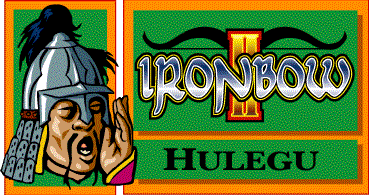
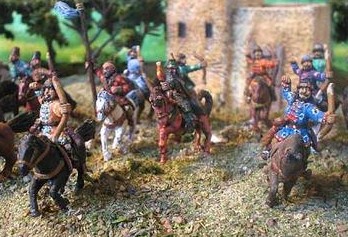
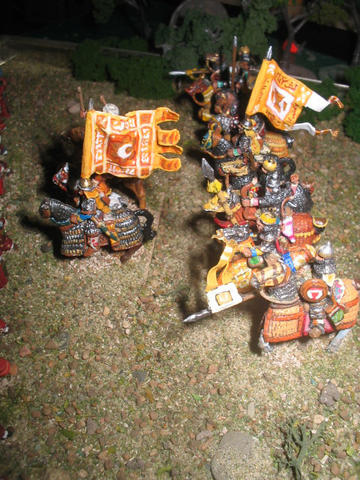
Historical Background
Michael decided to claim his new holdings by sending his brother, the Sebastocrator Constantine, seconded by the Grand Domestic Alexius Philes on a campaign through the Archipelago to the Morea. With them went an army of perhaps 15,000, 5-6,000 of which were Turkish mercenaries. They traveled on a fleet of Genoese ships (Genoa had allied with Michael against their enemies the Venetians) while a Byzantine fleet ravaged the Archipelago and Negroponte.
Constantine landed in early 1263 at Monemvasia, at the time held by the Grand Constable Michael Cantacuzenus. Together they then marched into Lakonia, and besieged Sparta. William, upon hearing the news, left his capital Andravida in the hands of his Greek Bailli, John Katavas, and headed to Corinth to gather up some allies, specifically from the new Duke of Athens, Jean de la Roche. The Sebastocrater saw an opportunity in William’s absence, and hastily raised the siege, force marching his men towards Andravida. He encamped at Prinitza, some miles south of the capital, and rested his men just on the other side of a narrow defile. The bailli John, told of his proximity, called up his garrison of 300 knights (and perhaps other native troops and foot) and rode to the defile to espy the enemy, who he found still encamped. Though suffering from gout, he and his knights quickly fell on them, and after a short sharp struggle, in which the Achaeans claimed they saw St. George fighting at their side, routed the Byzantines. Constantine and the remnants of the army fled to Mistra, where they stayed for some time, recruiting the local Tzakones (like the Melingoi) into their forces.
During that interim, the mixed Byzantine-Genoese fleet of 48 galleys, while cruising near the isle of Spetsai in the bay of Argos, ran across a Venetian fleet of 32 galleys. It seemed that the Allied fleet should easily triumph over their smaller foe, but all was not well amongst the allies. Half of the Genoese ships avoided battle (perhaps striking for back pay), allowing the rest to be scattered, at a loss of one admiral and 1000 men (of Genoese; Byzantine losses are not known). Along with the fleet went the alliance, and The Emperor dismissed the rest of the Genoese fleet from his service.
After a while, Constantine made another try on William’s capital. About ten miles south east of Andravida, just outside the town of Sergiana, and in sight of the ruins of ancient Olympia in Elis, his army met the Achaean one.
The battle had an inconclusive outcome. Early in the fighting, The Grand Constabulos was killed, one source saying that he died or was slain after falling from his horse. Constantine lost heart and called a withdrawal.
The Byzantines went south, clearly with most of the army intact. However, Constantine soon returned to Constantinople under the pretext of his contracting some illness, essentially abandoning the campaign. The remaining officers obviously had money problems, for the Turks, with no booty and claiming that their pay was 6 months in arrears, left the service of Byzantium for that of Achaea. William, his numbers now bolstered, now took the initiative and marched south to engage the enemy. The remaining Byzantine generals, Philes and Makrenos, were a bit wilier than Constantine, and arranged for a grand ambush around and behind the ridge of the pass of Makry Plagi, some miles north of Kalamata.
The ambush gave William a rough handling for a while, with unit after unit emerging from hiding (the favoured tactic of the Tzakones) but the sudden appearance of the turncoat Turks behind the Byzantine flank was too much for them, and the army fled, taking shelter behind the walls of Mistra. William made a demonstration before it, but new he could not storm it, so after ravaging the area, went home, declaring victory. With this the campaign came to an end. It would be a long time before the Byzantines would fully restore their power in the Morea again, but the situation did cause the Greek inhabitants of Lakonia to seek permanent safety within the walls of Mistra, which they began to strengthen and enlarge. This fortification would eventually form the nucleus of the last great flowering of the fading Byzantine Empire- The Despotate of the Morea.
